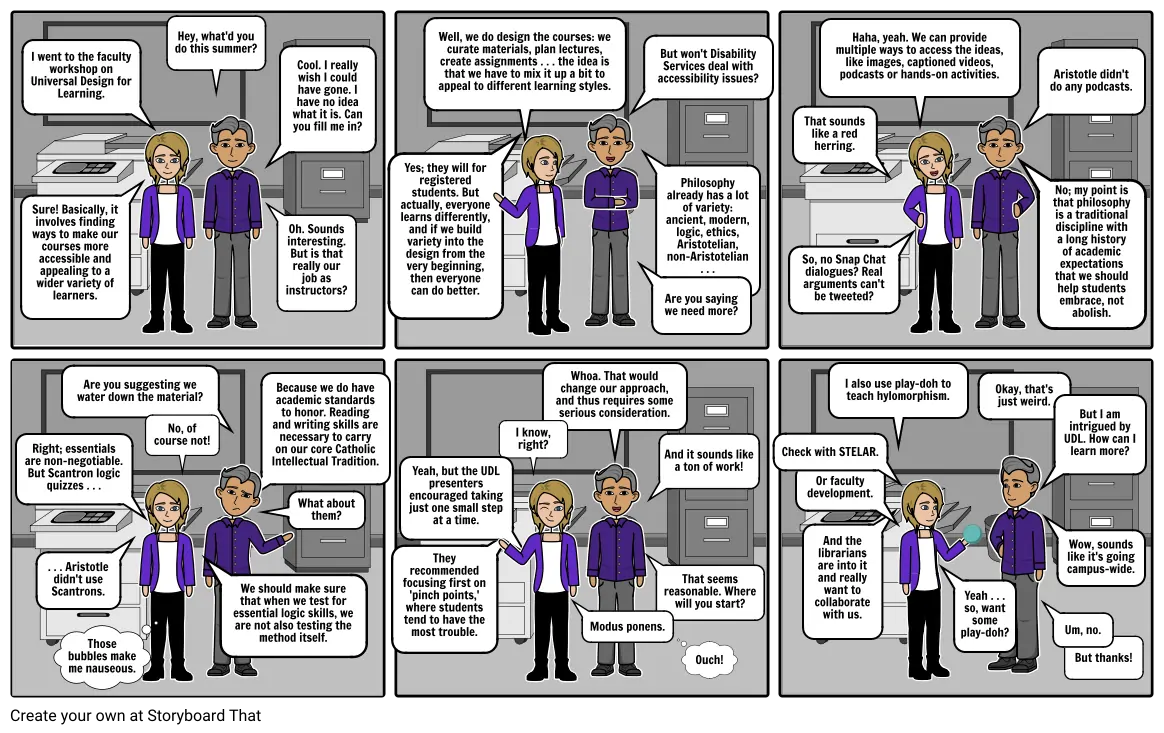Universal Design for Learning

Storyboard Text
- Sure! Basically, it involves finding ways to make our courses more accessible and appealing to a wider variety of learners.
- I went to the faculty workshop on Universal Design for Learning.
- Hey, what'd you do this summer?
- Cool. I really wish I could have gone. I have no idea what it is. Can you fill me in?
- Oh. Sounds interesting. But is that really our job as instructors?
- Yes; they will for registered students. But actually, everyone learns differently, and if we build variety into the design from the very beginning, then everyone can do better.
- Well, we do design the courses: we curate materials, plan lectures, create assignments . . . the idea is that we have to mix it up a bit to appeal to different learning styles.
- But won't Disability Services deal with accessibility issues?
- Are you saying we need more?
- Philosophy already has a lot of variety: ancient, modern, logic, ethics, Aristotelian, non-Aristotelian . . .
- So, no Snap Chat dialogues? Real arguments can't be tweeted?
- That sounds like a red herring.
- Haha, yeah. We can provide multiple ways to access the ideas, like images, captioned videos, podcasts or hands-on activities.
- No; my point is that philosophy is a traditional discipline with a long history of academic expectations that we should help students embrace, not abolish.
- Aristotle didn't do any podcasts.
- Right; essentials are non-negotiable. But Scantron logic quizzes . . .
- . . . Aristotle didn't use Scantrons.
- Those bubbles make me nauseous.
- Are you suggesting we water down the material?
- No, of course not!
- We should make sure that when we test for essential logic skills, we are not also testing the method itself.
- Because we do have academic standards to honor. Reading and writing skills are necessary to carry on our core Catholic Intellectual Tradition.
- What about them?
- They recommended focusing first on 'pinch points,' where students tend to have the most trouble.
- Yeah, but the UDL presenters encouraged taking just one small step at a time.
- I know, right?
- Whoa. That would change our approach, and thus requires some serious consideration.
- Modus ponens.
- That seems reasonable. Where will you start?
- And it sounds like a ton of work!
- Ouch!
- Check with STELAR.
- Or faculty development.
- And the librarians are into it and really want to collaborate with us.
- I also use play-doh to teach hylomorphism.
- Yeah . . . so, want some play-doh?
- Okay, that's just weird.
- But I am intrigued by UDL. How can I learn more?
- Um, no.
- Wow, sounds like it's going campus-wide.
- But thanks!
Over 30 Million Storyboards Created

